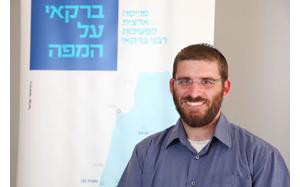
Rabbi Shachar, please tell us a little about yourself:
I am 37 years old. I am married to Renana and we have 5 children: Simchi (9), Oriah and Shalem (7), Shilat (3) and Emuna (1). I am the rabbi of Congregation Meir Modiin, in Modiin and I also teach at the Hesder Yeshiva in Modiin.
Why did you decide to become a community rabbi?
The community rabbinate is a very big challenge. Becoming a community rabbi is not a decision to be taken lightly. When the community asked me to become their rabbi I had many dilemmas about whether to agree or refuse. What was ultimately decisive was the desire to serve the other, the one in need, the strengthening of the Torah, Halacha and the fear of heaven in our midst.
Why did you decide to become a community specifically in Modiin?
While this is the case regarding any rabbinic position in Israel or anywhere in the world it is even more true about Modiin. Modiin is mostly comprised of a population that is middle and upper class and it therefore seems that less money is needed to be invested in thease areas. So, we developed Torah communities and Garinei Torah for development cities and the periphery. It has only been in the last few years that we have begun to understand that it is precisely in the big cities where there is a very strong need in strengthening Torah in the midst of all shades of populations and in strengthening the place of Halacha. Modiin is a wonderful city with terrific people who really enjoy hearing Torah lessons at a very high level and with spiritual depth.
Why was it important to you to participate in Barkai?
Certainly, beyond the Halachic and Torah matters, a community rabbi requires skills in order to deal with various situations that arise in the communities, solutions to which are not necessarily found in the books of Halacha. Dealing with community safety, addictions, mental illnesses and marriage counseling in a professional and kind manner is only the tip of the iceberg of what a community rabbi deals with routinely.
Did you benefit from Barkai? If so, how?
We learned about all of these topics and more during the intensive and fascinating training of Barkai. These are tools that are priceless: public speaking, familiarity with complicated psychological issues, mediation skills and even the ability to identify complex problems. All of this and more I learned at Barkai and I use these tools quite regularly in my congregation.
What is your vision for your rabbinate?
The rabbinate in my world is very inclusive. It is not only about the halachic realm or giving classes, but rather, first and foremost, leading a community, bringing a community closer to God and to holiness, helping every person in need, loving and being attentive to each individual, spearheading Torah activities for adults and for youth, helping community members deal with different kinds challenges and to demonstrate how all of these tools emanate from the Torah and are an integral part of it.
What is the main message you will convey to your congregation over the coming high holidays?
The message that I wish to convey is the love of the other. The importance of loving our neighbor, of loving every person, is very large and serves as the basis of the entire Torah. The sins that are committed against our neighbors are not atoned for on Yom Kippur until they are appeased. This is the message that I wish to convey to my community and to all of Israel.

